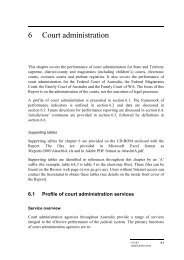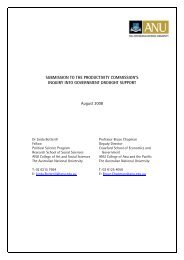Department of Foreign and Trade (PDF - 43 Kb) - Productivity ...
Department of Foreign and Trade (PDF - 43 Kb) - Productivity ...
Department of Foreign and Trade (PDF - 43 Kb) - Productivity ...
Create successful ePaper yourself
Turn your PDF publications into a flip-book with our unique Google optimized e-Paper software.
5. Possible Implications <strong>of</strong> Negotiations for Current Practice<br />
5.1 The various proposals for amendments to the Anti-Dumping <strong>and</strong> SCM<br />
Agreements remain under consideration by WTO Members in the Rules Negotiations<br />
Group (RNG). The RNG Chair has issued draft texts for both agreements but<br />
discussions are ongoing, including on proposals not incorporated into the draft text.<br />
Several proposals may have implications for the administration <strong>and</strong> implementation <strong>of</strong><br />
Australia’s anti-dumping <strong>and</strong> countervail systems. These include:<br />
(i) Proposals on the practice <strong>of</strong> ‘zeroing’<br />
5.2 ‘Zeroing’ is an investigative methodology used by (primarily the United<br />
States’) anti-dumping authorities, which allegedly makes it easier for an authority to<br />
find dumping. It also results in findings <strong>of</strong> higher dumping margins. To determine<br />
whether dumping exists <strong>and</strong> its magnitude, authorities normally compare a ‘weighted<br />
average normal value’ <strong>of</strong> the product with a ‘weighted average <strong>of</strong> prices <strong>of</strong> all<br />
comparable export transactions’ 2 . When zeroing, authorities convert to zero value<br />
any negative dumping margins (ie where the export price is higher than the normal<br />
value) for the purpose <strong>of</strong> determining the average <strong>of</strong> prices <strong>of</strong> ‘all comparable export<br />
transactions’.<br />
5.3 Opponents <strong>of</strong> zeroing say it is a ‘biased <strong>and</strong> partial method for calculating the<br />
margin <strong>of</strong> dumping <strong>and</strong> inflates anti-dumping duties’. 3 They seek to codify WTO<br />
dispute settlement findings outlawing zeroing in most circumstances. The United<br />
States argues it is a legitimate practice <strong>and</strong> that any Doha Rules outcome clarify the<br />
use <strong>of</strong> ‘zeroing’. Members on both sides <strong>of</strong> the debate have proposed amendments,<br />
with the United States calling for zeroing to be expressly permitted <strong>and</strong> several other<br />
Members calling for it to be expressly prohibited. Australia does not practice<br />
‘zeroing’. In our view, ‘zeroing’ is not permitted under the Anti-Dumping Agreement<br />
<strong>and</strong> no amendments to the text are required to preserve this position.<br />
5.4 Adoption <strong>of</strong> proposals to either prohibit or permit zeroing could have<br />
implications for both the practice <strong>of</strong> Australian authorities <strong>and</strong> the interests <strong>of</strong><br />
Australian exporters. In particular, if zeroing were to be permitted, more WTO<br />
Members may adopt the practice, exposing Australian exporters to more <strong>and</strong>/or higher<br />
anti-dumping duties. Australian practice could be a factor considered by our trading<br />
partners in determining whether or not to use zeroing in investigations <strong>of</strong> dumping by<br />
Australian companies. The interests <strong>of</strong> Australian exporters should be taken into<br />
account in any consideration <strong>of</strong> possible changes to Australian investigating<br />
authorities’ approach to zeroing.<br />
2 See Articles 2.4 <strong>and</strong> 2.4.2 <strong>of</strong> the Anti-Dumping Agreement.<br />
3 TN/RL/W/215.

















